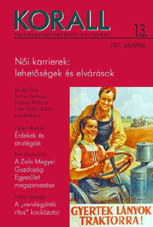Női szerepek és szociálpolitika Hungaryon 1920–1944
Women’s Roles and Social Policy in Hungary 1920–1944
Author(s): Péter HámoriSubject(s): History
Published by: KORALL Társadalomtörténeti Egyesület
Keywords: social history; Hungary; women’s emancipation; women’s roles; women’s labour; Social politics; women policy; catholicism
Summary/Abstract: In welfare policies, next to helping out those in need, the intention to „discipline” was quite recognizably present from the beginning on in entire Europe as well as in Hungary. This ambition covered the entire scope of life of the concerned, including family relations and gender identity. Those involved in welfare policies aspired to control these spheres as well, as in return for benefits given. At the same time, the range of expectations and prescribed behavioural patterns were extended to social workers, too: in our case, social political literature, education and social expectations prescribed a clearly definable set of behavioural norms for – usually unmarried – women in the welfare profession. The study examines this question through the activity of two products of Hungarian welfare policies of the 30’s and 40’s: poor (beggar) attendance according to the Egri (later Hungarian) Norm and the National Foundation for the Protection of the People and the Family. This choice seems reasonable, since contemporary welfare politicians regarded these two systems the highest peak of Hungarian welfare activity. Accordingly, both professional literature on the topic and propaganda paid great attention to them and thanks to this, intentions of social reform were more in the foreground than in the case of other welfare policy systems.
Journal: Korall - Társadalomtörténeti folyóirat
- Issue Year: 2003
- Issue No: 13
- Page Range: 30-48
- Page Count: 19
- Language: Hungarian

